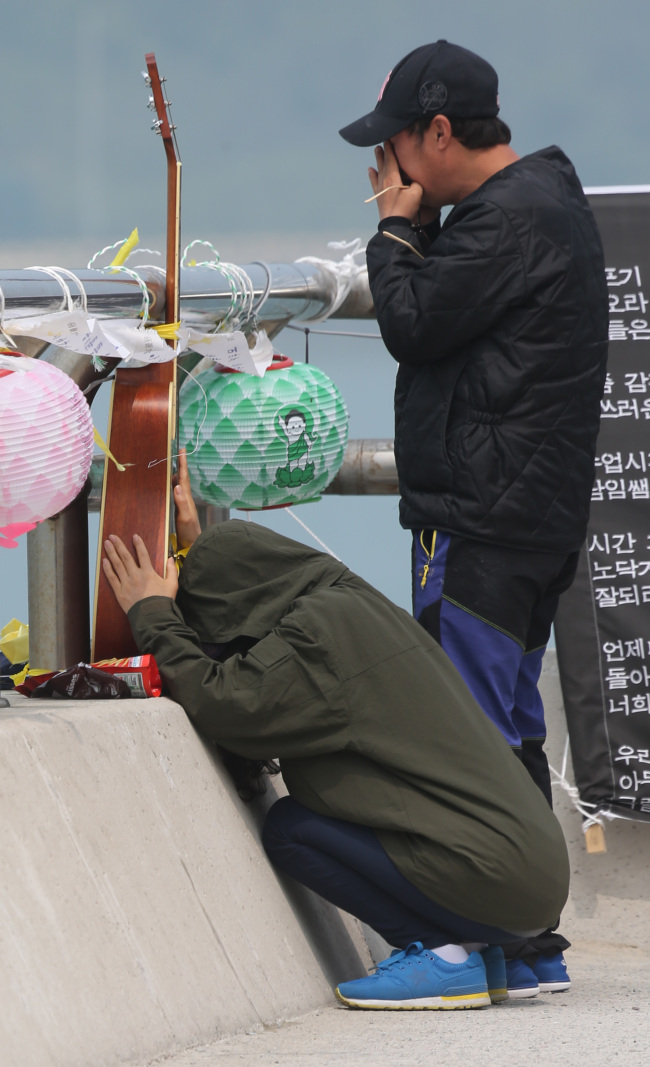[Ferry Disaster] Ferry disaster reveals dark side of Korea’s ‘compassionate’ culture
By Korea HeraldPublished : May 22, 2014 - 20:35
This is the fourth in a series of articles that examine Korean’s preparedness for disasters and social risks in light of the recent Sewol tragedy. ― Ed.
Compassion is a virtue valued highly in Korean life. It has been credited with bringing Koreans together for its rapid economic rise and helped maintain social cohesion to create a more inclusive culture.
But the recent ferry disaster has brought to the fore compassion’s dark side. Analysts say that “compassionate” officials in charge of the social safety system tend to overlook minor violations of safety rules upon emotional pleas of the offenders despite the risk of the offenses leading to a deadly safety fiasco.
“If you stick too strictly to rules, standards and principles in Korea, your life will get difficult. You’ll be labeled a maverick and a real stick in the mud, or be criticized as cold-blooded,” said Kim Sae-won, international commerce professor at Seoul’s Catholic University.
“Thus, there arise a series of loopholes here and there in our safety system. In the area of social safety, we actually need stubborn, callous and professional civil servants.”
Kim pointed to rampant cronyism and favoritism in Korean society, stressing that Koreans focus too much on school and regional connections, and other personal ties, and tend to make unprofessional, emotion-driven decisions.
“Personal ties, warm-heartedness and emotional attachment ― what we call ‘jeong’ in Korean ― are very crucial for Koreans. To keep the relations, they even dare to distort rules or modify them,” she said.
Compassion is a virtue valued highly in Korean life. It has been credited with bringing Koreans together for its rapid economic rise and helped maintain social cohesion to create a more inclusive culture.
But the recent ferry disaster has brought to the fore compassion’s dark side. Analysts say that “compassionate” officials in charge of the social safety system tend to overlook minor violations of safety rules upon emotional pleas of the offenders despite the risk of the offenses leading to a deadly safety fiasco.
“If you stick too strictly to rules, standards and principles in Korea, your life will get difficult. You’ll be labeled a maverick and a real stick in the mud, or be criticized as cold-blooded,” said Kim Sae-won, international commerce professor at Seoul’s Catholic University.
“Thus, there arise a series of loopholes here and there in our safety system. In the area of social safety, we actually need stubborn, callous and professional civil servants.”
Kim pointed to rampant cronyism and favoritism in Korean society, stressing that Koreans focus too much on school and regional connections, and other personal ties, and tend to make unprofessional, emotion-driven decisions.
“Personal ties, warm-heartedness and emotional attachment ― what we call ‘jeong’ in Korean ― are very crucial for Koreans. To keep the relations, they even dare to distort rules or modify them,” she said.

In the wake of the ferry disaster that left more than 300 people dead or missing, the expression “gwanpia” has become a buzzword, referring to corrupt bureaucrats with collusive connections to industries.
The gwanpia have been upbraided for their failed oversight over the safety management of the ill-fated ship. They were found to have failed to pay due attention to the precarious operation of the decades-old vessel even though it had been modified to accommodate more passengers at the expense of their safety and carried too much cargo without fastening it securely.
Earlier this week, President Park Geun-hye vowed to revamp the public officialdom to stamp out corruptive practices by the gwanpia. But skepticism runs deep over her reform endeavor as the bureaucrat-industry collusion has been too deeply ingrained in Korean society.
Corruption in the realm of public safety has revealed the erosion of the rule of law. Despite a host of rules and regulations for maritime safety, analysts say, many regulators have failed to strictly enforce them under a culture of “jeong,” a Korean term referring to deep affection, sympathy or emotional bond.
Lim Ji-bong, professor at Sogang University’s law school, pointed out that Korea’s judiciary has so far not seriously dealt with the safety cases and tended to make “compassionate” rulings.
“Rather than emphasizing the gravity of the social safety issues, judges tend to take those issues rather lightly, apparently thinking that some defendants were just unlucky to have engaged in safety accidents,” said Lim.
“Thus, there have been rulings meting out just light sentences (to offenders). But when it comes to cases of safety accidents directly linked to people’s lives, the judiciary should hold the offenders strictly responsible for their wrongdoings.”
Although the lax enforcement of safety rules and regulations is cited as a major cause of the ferry disaster, lawmakers have churned out scores of new bills to enhance passenger safety, tighten ferry operators’ responsibility and drive out corrupt bureaucrats. The bills also included one to prevent former public servants from peddling influence to ask for business favors.
“The problem is that some rules have not been. strictly enforced by the state entities and followed by citizens. The ferry disaster served as a stern reminder of this reality,” said Lim of Sogang University.
By Song Sang-ho (sshluck@heraldcorp.com)
-
Articles by Korea Herald







![[Graphic News] More Koreans say they plan long-distance trips this year](http://res.heraldm.com/phpwas/restmb_idxmake.php?idx=644&simg=/content/image/2024/04/17/20240417050828_0.gif&u=)
![[KH Explains] Hyundai's full hybrid edge to pay off amid slow transition to pure EVs](http://res.heraldm.com/phpwas/restmb_idxmake.php?idx=644&simg=/content/image/2024/04/18/20240418050645_0.jpg&u=20240419100350)






![[From the Scene] Monks, Buddhists hail return of remains of Buddhas](http://res.heraldm.com/phpwas/restmb_idxmake.php?idx=652&simg=/content/image/2024/04/19/20240419050617_0.jpg&u=20240419175937)

![[KH Explains] Hyundai's full hybrid edge to pay off amid slow transition to pure EVs](http://res.heraldm.com/phpwas/restmb_idxmake.php?idx=652&simg=/content/image/2024/04/18/20240418050645_0.jpg&u=20240419100350)

![[Today’s K-pop] Illit drops debut single remix](http://res.heraldm.com/phpwas/restmb_idxmake.php?idx=642&simg=/content/image/2024/04/19/20240419050612_0.jpg&u=)